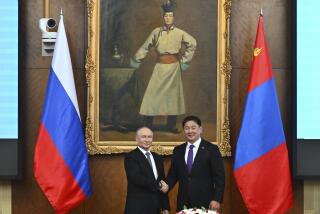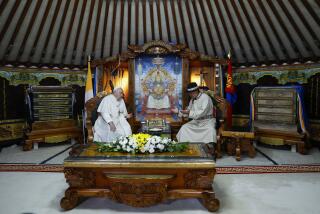Rumsfeld Stops in Mongolia
- Share via
ULAN BATOR, Mongolia — King Richard III of England once offered up his kingdom for a horse. Defense Secretary Donald H. Rumsfeld, whose department contributes $18 million a year to Mongolia, received a horse Saturday simply for showing up in this far-flung capital.
During Rumsfeld’s brief stop in Ulan Bator, Mongolian Defense Minister Tserenkhuu Sharavdorj presented him with a caramel-colored Mongolian horse, a gift that powerful visitors have received in this wind-swept country for hundreds of years.
Since dignitaries began arriving in Mongolia on airplanes, it has become custom for visitors to politely ask their hosts to allow a local herdsman to care for the horse and to provide it with a good home.
By tradition, no person besides Rumsfeld will be allowed to ride the horse, which will come under the care of a herdsman named Bilegerdene, who lives 70 miles from the capital city. There, as one official at the Mongolian Defense Ministry put it, “only the steppes wind will be on his back.”
Rumsfeld quickly named the horse “Montana” in honor of the Mongolian landscape, which he said reminded him of the state where his wife, Joyce, was born.
Rumsfeld’s visit was the first by a U.S. Defense secretary to Mongolia. His stop comes before a visit by President Bush next month, a signal of the growing strategic importance of this Central Asian nation of desert and steppes.
Since the decline of Mongolia’s power in the centuries after Genghis Khan’s rule, the country has fallen under the sway of its two potent neighbors, Russia and China.
For most of the 20th century, Mongolia was a satellite state of the Soviet Union, and Soviet troops flooded into the country during the 1960s to send a belligerent message to the Chinese. During the height of the Cold War, this warrior nation boasted a 70,000-strong military.
That number is down to 11,000 today, one of the reasons Mongolia -- given its history with its neighbors -- is eager to bolster its ties with the United States. With U.S. officials wary of China’s long-term ambitions as it modernizes its military, the Bush administration sees benefits to strengthening its ties with Ulan Bator.
Mongolia, Rumsfeld said Saturday, is “establishing a model that other Central Asian countries can observe and conceivably learn from.”
Standing in front of a giant statue of Khan during a news briefing with Sharavdorj, Rumsfeld was asked whether the United States wished to establish a military base or a listening post on Mongolian soil.
“We’ve had no discussions along that line, and I know of no intention to do that,” he replied.
The Pentagon is currently working to develop the capabilities of the Mongolian army to provide peacekeeping forces for crises around the world. The aim is to build a force of about 5,000 troops that the United Nations would be able to deploy immediately when needed.
Mongolia has 131 troops in Iraq and about a dozen in Afghanistan, and on Saturday, Rumsfeld thanked a roomful of Mongolian veterans of the two conflicts for their service.
He directly thanked two young sergeants who stopped a suicide truck bomber from blowing up a Polish army logistics hub near Hillah, Iraq, in early 2004. The two Mongolian soldiers, who were providing base security, shot and killed the driver before he was able to detonate his explosives at the gate.
The bulk of the military aid the U.S. gives annually to Mongolia is earmarked for modernizing its army’s Soviet-era equipment.
More to Read
Sign up for Essential California
The most important California stories and recommendations in your inbox every morning.
You may occasionally receive promotional content from the Los Angeles Times.













